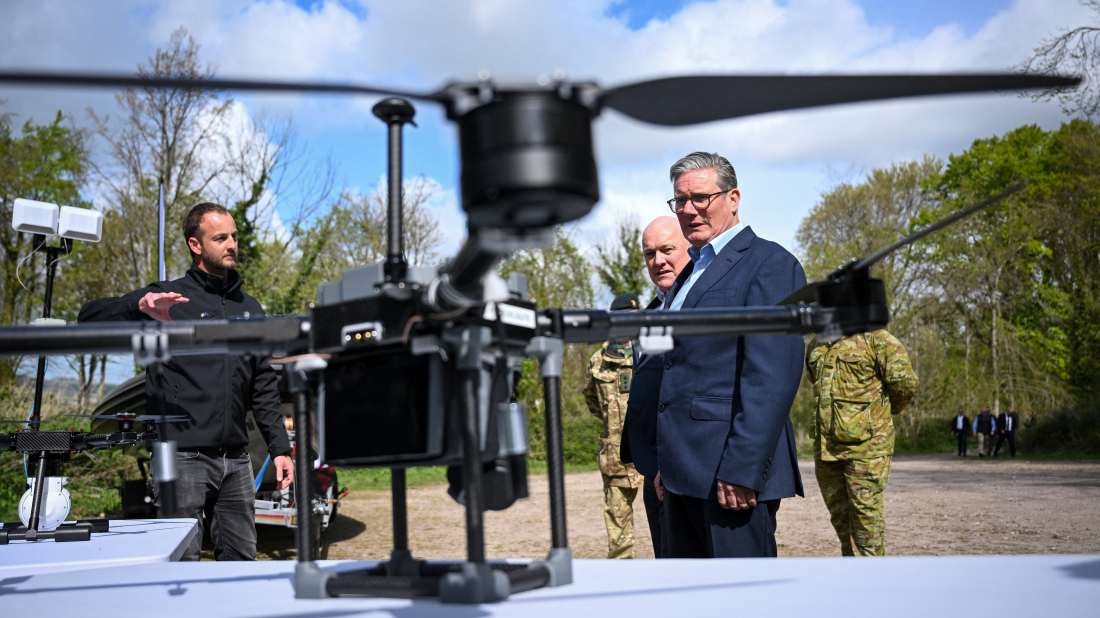live U.S. confirms troop deaths: All the latest news on Middle East conflict
The widening war between Iran, U.S. and Israel is leaving civilians and soldiers caught in its wake. Thousands are stranded across the Gulf, flight...

British soldiers will soon have the authority to shoot down drones threatening UK military bases under new powers set to be unveiled by Defence Secretary John Healey.
The plan, which introduces a new “kinetic option”, will allow British troops or Ministry of Defence (MoD) police to destroy drones that endanger military sites, a step beyond current rules that limit action to diverting or disrupting signals.
Until now, soldiers could only shoot down an unidentified drone in extreme circumstances. The move aims to let troops act faster amid rising drone activity across Europe
The move follows a string of mysterious drone sightings last year at airbases used by US forces, including RAF Lakenheath and RAF Mildenhall in Suffolk, RAF Feltwell in Norfolk, and RAF Fairford in Gloucestershire.
Around 60 RAF personnel were deployed to assist the US Air Force’s investigation, though neither US nor UK officials have revealed who was behind the activity.
The affected airbases have strategic importance for the US military, which recently deployed F-22A fighter jets to RAF Lakenheath following airstrikes on Iranian nuclear sites in June.
The new powers will initially apply only to military locations but could later extend to civilian areas such as airports, where drone incursions have repeatedly disrupted air traffic.
Europe has also seen a sharp rise in drone incidents. Earlier this month, EU leaders met in Denmark to discuss coordinated defences, including a proposed multi-layered “drone wall” to detect and destroy Russian drones.
Twenty Russian drones reportedly entered Polish airspace in September, while Russian MiG-31 jets violated Estonia’s airspace later that month, both incidents Moscow has denied.
Several European airports, including those in Munich, Denmark, and Norway, were forced to close after drones were spotted near airports and military zones.
Authorities say there is no evidence linking the incidents directly to Russia, but security agencies across Europe are on alert.
The Kremlin is utilising the recent United States and Israeli military strikes on Iran to validate its ongoing war in Ukraine. Russian officials are pointing to the escalation in the Middle East as evidence that Western nations do not adhere to international rules.
Saudi Arabia’s state oil giant Saudi Aramco closed its Ras Tanura refinery on Monday following an Iranian drone strike, an industry source told Reuters as Tehran retaliated across the Gulf after a U.S.-Israeli attack on Iranian targets over the weekend.
U.S. President Donald Trump said the U.S. military has enough stockpiled weapons to fight wars "forever"; in a social media post late on Monday. The remarks came hours before conflict in Iran and the Middle East entered its fourth day.
Türkiye raised its security level for Turkish-flagged vessels in the Strait of Hormuz to Level 3 on Sunday (2 March). The development follows Iranian restrictions on shipping after U.S. and Israeli strikes and confirmation of Supreme Leader Ali Khamenei’s death.
China’s Foreign Minister Wang Yi has held talks with his Russian counterpart Sergei Lavrov following recent military strikes carried out by the United States and Israel on targets in Iran, as tensions in the Middle East continue to rise.
Strikes across the Middle East are intensifying, fuelling travel disruption, driving up global energy prices and forcing diplomatic missions to shut their doors.
U.S. President Donald Trump has said the United States has a “virtually unlimited supply” of munitions and is capable of sustaining military action indefinitely, as the conflict with Iran entered its fourth day.
The United Nations has called for an investigation into a deadly attack on a girls’ primary school in Iran, which Iranian officials say has killed more than 100 children. The U.S. has said its forces “would not” deliberately target a school.
U.S. first lady, Melania Trump chaired a UN Security Council meeting on children and education in conflict on Monday (2 March), a move criticised by Iran as hypocritical following U.S. and Israeli strikes that triggered a UN warning about risks to children.
Start your day informed with AnewZ Morning Brief. Here are the top news stories for the 3rd of February, covering the latest developments you need to know.
You can download the AnewZ application from Play Store and the App Store.

What is your opinion on this topic?
Leave the first comment